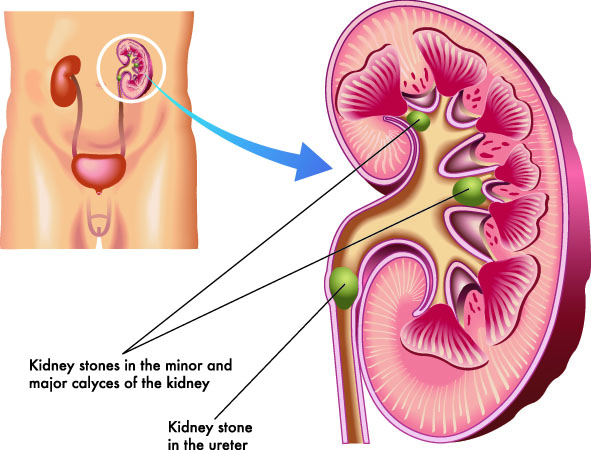Exploring the Manifestations and Causes of Kidney Stones in Contrast to Urinary System Tract Infections: A Comprehensive Overview
The expedition of kidney rocks and urinary system infections (UTIs) discloses an intricate interaction of symptoms and underlying reasons that necessitate cautious assessment. While both problems can bring about hematuria, they provide distinct clinical features and develop from various etiological variables. Recognizing the subtleties of each condition is crucial for efficient medical diagnosis and administration. What are the essential differences in their signs and symptoms, and exactly how might these notify treatment strategies? The response to these inquiries may provide important insights right into the avoidance and care of these usual urological concerns.
Introduction of Kidney Stones
Kidney stones, also called renal calculi, kind when particular compounds in the pee crystallize and aggregate, leading to the advancement of tough deposits within the kidneys. These rocks can differ in size, varying from a grain of sand to a golf round, and can be composed of numerous materials, the most typical being calcium oxalate, uric acid, struvite, and cystine. The formation of kidney rocks is influenced by several aspects, including dietary habits, fluid intake, and hereditary tendency.
Signs and symptoms of kidney rocks might include extreme pain in the back or side, blood in the urine, nausea, and regular urination, especially as the stone moves via the urinary system system. Medical diagnosis normally entails imaging studies such as ultrasound or CT scans, alongside urinalysis to determine the rock's composition.
Therapy choices vary based upon the dimension and sort of rock, in addition to the seriousness of symptoms (Kidney Stones vs UTI). Small stones may pass naturally with enhanced liquid consumption, while bigger stones might call for clinical interventions such as lithotripsy or medical elimination. Understanding the pathophysiology and risk factors connected with kidney stones is important for effective avoidance and administration
Review of Urinary System Tract Infections
Urinary system tract infections (UTIs) prevail bacterial infections that impact any kind of component of the urinary system, including the kidneys, ureters, bladder, and urethra. They mostly occur when germs, typically from the gastrointestinal system, go into the urinary system, resulting in inflammation and infection. UTIs are classified right into two main kinds: complex and uncomplicated. Uncomplicated UTIs typically happen in healthy individuals with regular urinary systems, while complex UTIs may develop in people with hidden conditions, such as structural problems or compromised immune systems.
The prevalence of UTIs is especially greater in women than males, mostly as a result of anatomical differences, such as a much shorter urethra. Risk aspects include sex-related activity, particular contraceptive approaches, urinary system retention, and dehydration. The diagnosis of UTIs is generally validated with pee examinations, which might expose the existence of bacteria, leukocyte, or red blood cells.

Signs And Symptoms of Kidney Stones
The discomfort connected with kidney rocks can show up in numerous methods, typically leading individuals to seek medical attention. One of the most typical symptoms is serious pain, generally localized in the reduced back or side, which may radiate to the abdomen or groin. This discomfort, often defined as sharp or cramping, can occur all of a sudden and may fluctuate in strength.
Additionally, people may experience hematuria, or blood in the urine, which can range from microscopic amounts to noticeable discoloration. This signs and symptom may be gone along with by adjustments in urinary routines, such as raised regularity or this website seriousness, along with discomfort during urination. Nausea and throwing up are likewise widespread, frequently arising from the body's response to intense pain.
In some cases, people may experience high temperature and chills, especially if a second infection develops as a result of the blockage triggered by the stones. Overall, the combination of severe pain, hematuria, modified urinary patterns, and gastrointestinal signs and symptoms can give substantial understanding into the existence of kidney rocks, requiring timely medical examination and intervention. Recognizing these signs is critical for prompt medical diagnosis and effective monitoring of the problem.
Signs And Symptoms of Urinary Tract Infections
Infections within the urinary tract usually offer a series of distinctive signs that can significantly influence life. One of the most usual symptoms include a consistent desire to urinate, typically accompanied by a burning experience during urination, referred to as dysuria. Individuals may also experience increased regularity of peeing, creating tiny quantities of pee each time.
Other remarkable signs and symptoms consist of foul-smelling or cloudy pee, which may show the existence of microorganisms or pus. In many cases, pee might appear pink or red due to the visibility of blood, a problem referred to as hematuria. In addition, people may experience pelvic pain or pressure, which can further aggravate the sensation of seriousness.
Systemic signs may additionally show up, such as fever, chills, and fatigue, especially if the infection has actually risen to the kidneys. It is necessary to recognize these symptoms early, as unattended urinary tract infections can result in much more serious problems. Kidney Stones vs UTI. Prompt medical attention is recommended when these signs and symptoms are observed, permitting proper diagnostic examination and therapy to relieve pain and avoid more health and wellness problems
Reasons For Each Condition
Often, kidney rocks and urinary system infections arise from distinctive yet in some cases overlapping reasons that can affect people in different ways. Kidney stones find out this here normally create because of metabolic elements, nutritional options, and hereditary proneness. Enhanced degrees of calcium, oxalate, or uric acid in the urine can lead to rock development. Dehydration, inadequate liquid intake, and high-sodium diets can exacerbate these problems, promoting condensation within the urinary system.

Comprehending these distinctive causes is crucial for avoidance and treatment. Kidney Stones vs UTI. While way of living adjustments might minimize the risk of kidney stones, appropriate hygiene and timely treatment of urinary system tract infections are vital for decreasing their recurrence and connected issues
Conclusion
In summary, kidney stones and urinary system infections existing unique symptoms and underlying reasons. Kidney stones are characterized by serious pain and metabolic variables, while urinary system infections mostly include microbial infections leading to urinary system seriousness and discomfort.
The exploration of kidney rocks and urinary system infections (UTIs) discloses a complicated interplay of symptoms and underlying reasons that require mindful evaluation.Urinary system infections (UTIs) are usual bacterial infections that affect any kind of part of the urinary system, including the kidneys, ureters, bladder, and urethra.Frequently, kidney stones and urinary system infections emerge from distinctive yet often overlapping causes that can influence people differently.In recap, kidney rocks and urinary system infections present distinctive signs and underlying reasons. Kidney stones are defined by serious discomfort and metabolic elements, while urinary system system infections mostly entail bacterial infections leading to urinary urgency and pain.